Unsure about your French table manners? Click Here to download > > How to avoid these 10 food etiquette mistakes !
- Home ›
- Plan Your France Trip ›
- Fall in France
Fall In France: How To Enjoy France In Autumn To The Fullest
Published 21 August 2024 by Leyla Alyanak — Parisian by birth, Lyonnaise by adoption, historian by passion
France in fall is hard to pin down. Not only is each region different, but each month as well: you can’t begin to compare the end of September with early December! Let’s try to deconstruct autumn in France because however diverse, it’s still one of my favorite seasons here.
With summers in France getting hotter each year, we tend to welcome the fall season with open arms.
Where I live in Eastern France, we get a proper autumn, with bright red leaves and crispy skies, not to mention the occasional sprinkling of snow. But if I jump into my car and head a couple of hours south, I might still be able to lie on the beach. Head north, and I’ll probably need an umbrella to walk among the autumn leaves.
One thing you cannot take away from autumn in France: its beauty.
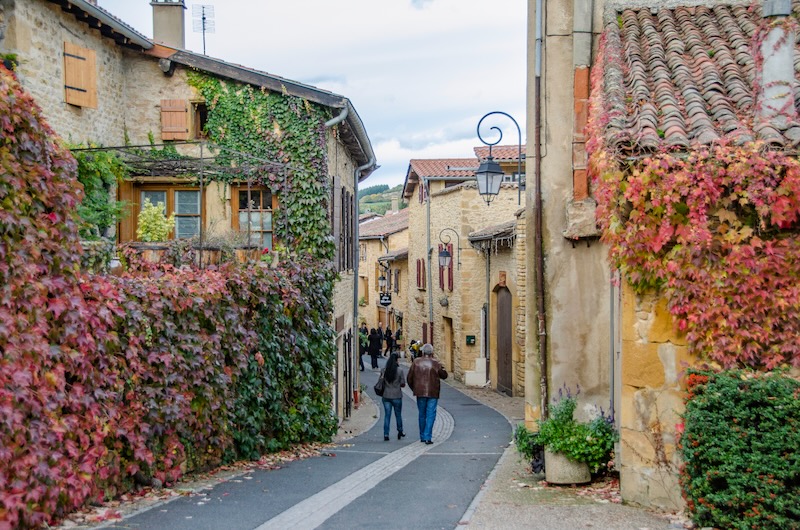 France’s medieval villages are especially striking in autumn, with rustic vines climbing their stone walls. Here, I’m in Oingt in October ©OffbeatFrance/Anne Sterck
France’s medieval villages are especially striking in autumn, with rustic vines climbing their stone walls. Here, I’m in Oingt in October ©OffbeatFrance/Anne SterckThe best place to spend fall in France?
You never know. So pack your spirit of adventure, your layers of clothes, and your tolerance, and come visit during one of the year’s most stunning – and unpredictable – seasons.
12 Places to visit in France in fall
- 1. Alsace
- 2. Burgundy
- 3. Bordeaux
- 4. Loire Valley
- 5. Provence and the French Riviera
- 6. Normandy
- 7. Paris
- 8. Corsica
- 9. The Dordogne
- 10. Ardèche
- 11. The French Alps
- 12. Lyon
Best things you can do in autumn in France
- Attend festivals and wine festivals
- Head out to view the fall foliage
- Eat your heart out
- Take a cooking class or taste some wine
- Enjoy the regal life
- Follow a route
- Take a hike
- If it rains…
- Special fall events in France
- Fête des Vendanges (Late September to late October)
- Halloween: 31 October
- La Toussaint (All Saints’ Day): 1 November
- Armistice Day: 11 November
- Beaujolais Nouveau Day (Third Thursday in November)
- Christmas markets (from end November onwards)
- Lyon Lights Festival: 8 December
NOTE: Pages on this site may contain affiliate links, which support this site. See full Privacy Policy here.
There’s so much to see and do during the autumn months in France that choosing where to go is going to be your biggest challenge.
I’ll try to help your decision-making process by splitting this article into several parts: where to go in France in fall, what to do in autumn in France, and things to know about fall travel anywhere in the country.
WHAT IS THE FRENCH FOR AUTUMN? HOW DO YOU SAY FALL SEASON IN FRENCH?
For once, it's an easy one.
It's spelled automne. But being French, it's pronounced oh-TON. And if you want to say the fall or autumn, you simply add an L and an apostrophe: l'automne.
12 Places to visit in France in fall
These are admittedly biased, and shamelessly based on my own personal tastes, but if you follow in my footsteps, I don’t think you’ll go wrong.
1. Alsace and its wine routes
Alsace is the meeting place for medieval villages, vineyards, and forests, all of which brighten in fall. The colors on the half-timbered houses of towns like Strasbourg or Colmar seem to stand out more, and the vineyards begin to turn a deep shade of gold. The Alsace Wine Route is ideal this time of year if you like the region’s famous Rieslings and Gewürztraminers.
In fact, the entire Grand Est region is proud of its stunning autumn foliage.
2. Burgundy - it has wine routes too!
The fall season in France seems irrevocably linked to wine.
If you’re looking for deep reds and lush vineyards, Burgundy should be on your list. Harvest time is in full swing, and the hilly vineyards are more beautiful now than at any other time of the year. Stop in Beaune to visit the famous Hospices de Beaune, or in Dijon to discover the city at its best – or find out more about mustard.
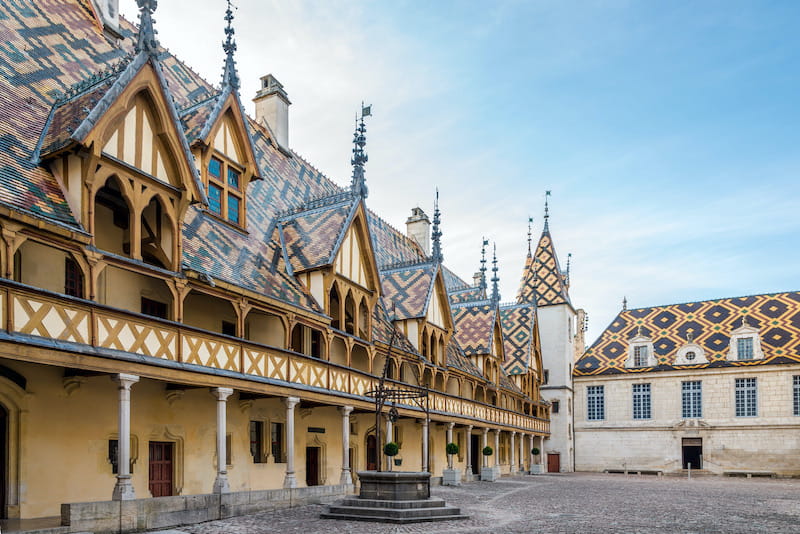 The Hôtel-Dieu Hospices de Beaune: A historic 15th-century hospital turned museum - and the heart of Burgundy’s famed wine auction
The Hôtel-Dieu Hospices de Beaune: A historic 15th-century hospital turned museum - and the heart of Burgundy’s famed wine auction3. Bordeaux - wait, more wine?
Bordeaux is also at its best in the fall. The surrounding vineyards are in full glory, the Bordeaux Wine Festival is a highlight, and even if you don’t drink, there’s still so much to do here.
Fall is also a great time to head down the coast and visit the Dune of Pilat, Europe’s tallest sand dune, and sample some seasonal seafood in any one of the local villages. This, I admit, is possibly my favorite thing to do in France in autumn.
Have plenty of time? Then push even further south to the Basque country, starting with Bayonne and ending with Saint-Jean-de-Luz – and let's not forget the interior!
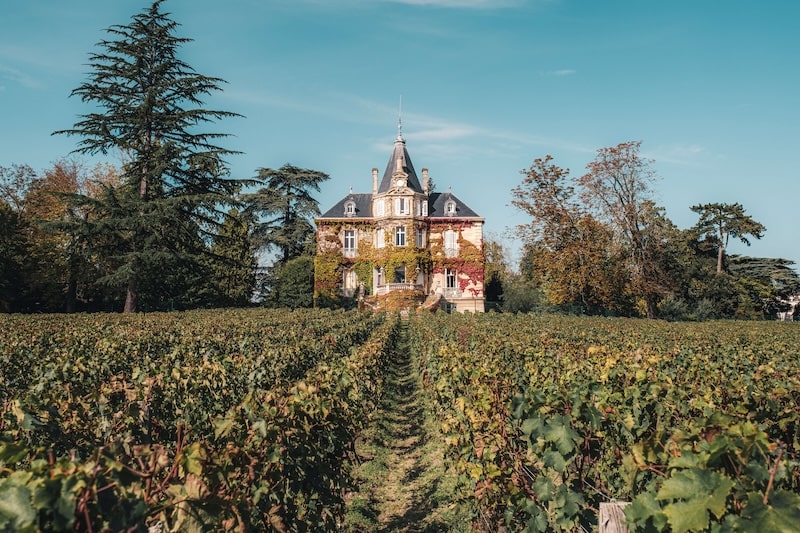 Bordeaux vineyards in autumn at the Château Les Carmes, Haut-Brion ©Teddy Verneuil
Bordeaux vineyards in autumn at the Château Les Carmes, Haut-Brion ©Teddy Verneuil4. Loire Valley and its royal castles
Autumn season in France is chateau time, with fewer crowds than in the summer months and without the winter chill, the Loire Valley itself a carpet of oranges, reds, and yellows.
Head for those with stunning gardens, like the curated geometric patches of Villandry, the majesty of Chambord, or the delights of Chenonceau. Oh, and yes, there’s wine here too.
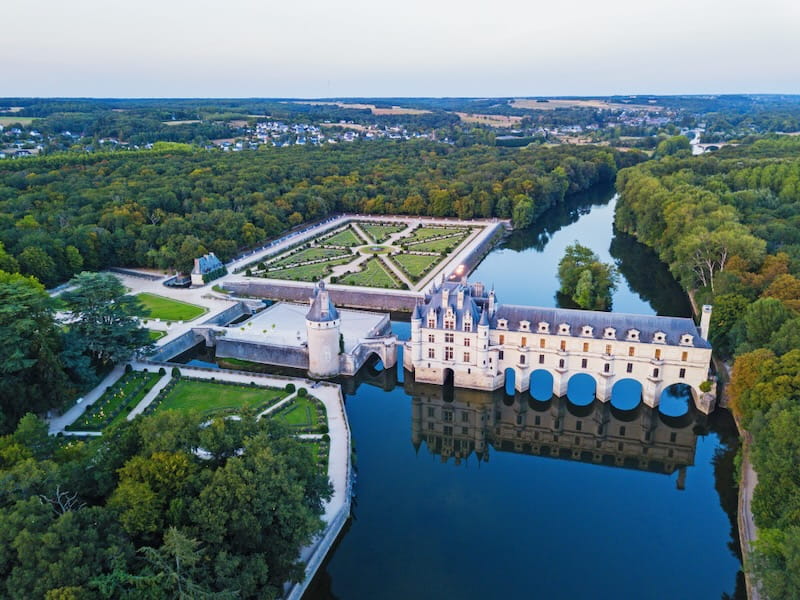
For an unforgettable experience, book yourself a hot air balloon trip and see this gorgeous view from above.
5. Provence and the French Riviera for some sun and warmth
Yes and yes! I find Provence suffocating in summer (I know many of you will disagree but we can't all love everything!) but once fall rolls in, I start wanting to explore every nook and cranny during the cooler days.
From tiny Luberon villages like Lacoste to the “big five” hilltop hamlets on the list of the most beautiful villages in France, the air becomes less heavy and the scents of autumn peek through – as do the vineyards because this, too, is a wine region.
6. Normandy's history
Autumn in Normandy is marked by apple harvests, so don’t forget to sample any dishes that are prepared with apples or Calvados, the famous local apple brandy.
With the summer crowds having returned home to Paris, you’ll have the luxury of choice in this region: head for historic Mont Saint-Michel or the D-Day beaches for some sightseeing al fresco.
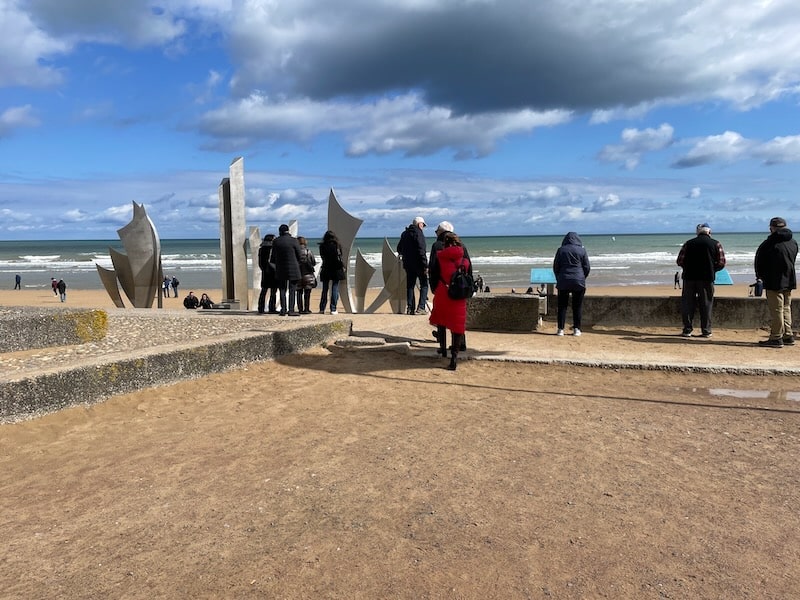 Yes, it can be a bit nippy in late fall on the D-Day beaches, but look at this amazing light on Omaha Beach at The Braves! ©OffbeatFrance
Yes, it can be a bit nippy in late fall on the D-Day beaches, but look at this amazing light on Omaha Beach at The Braves! ©OffbeatFrance7. Paris, always Paris
Of course. I didn’t list it first because I wanted you to discover a few of our other regions before reaching for Paris, which usually lies at the heart of any trip to France in the fall.
I like the fall season in Paris because the city buzzes with energy and the weather is perfect for walking tours – why not try a food tour or a tour of French Revolution sites to get to know more about our culture and history?
People have returned from weeks of summer holiday ready to face the year, and the cultural season is getting into swing. The gardens are pretty, with their golden trees, and Parisian cafés are filled with people-watchers sipping their coffees and, if the weather is fresh, their chocolat chaud.
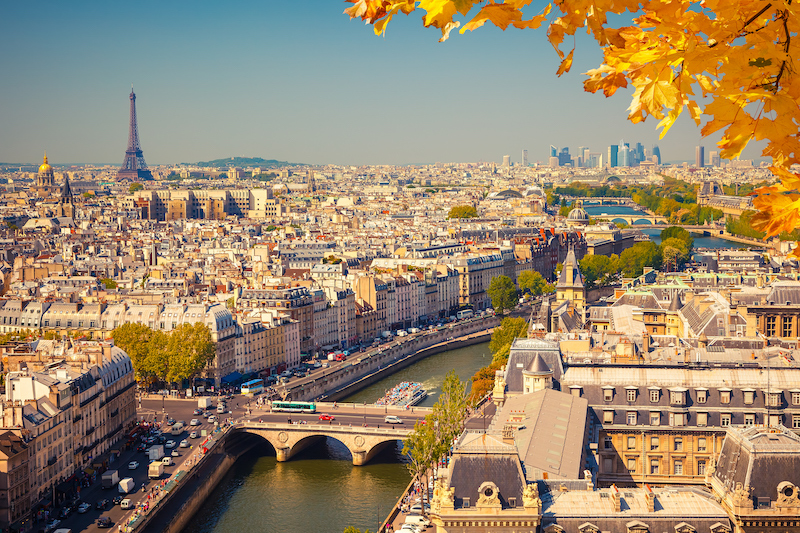
8. Corsica, for something different
Corsica is an island much loved by French vacationers, so in summer can be crowded, especially on its tiny roads, and there could be forest fires. To me, it’s a hassle I don’t need, because autumn in Corsica is an ideal season.
The weather stays mild (not like summer for swimming, but perfect for hiking) and coastal towns like Bonifacio or Ajaccio are easier to visit, as are the island’s more remote villages.
9. The Dordogne, for villages, castles and food
The Dordogne in autumn is still warm (at least in the earlier part of the season) and far less crowded.
Weather can be occasionally rainy (as can the rest of France, by the way) and foggy but it’s a time for all the regional products to go on show. Market stalls will be heaving with walnuts and truffles, and the romance of the region’s many medieval towns is hard to match – the old stone buildings against a backdrop of golden leaves.
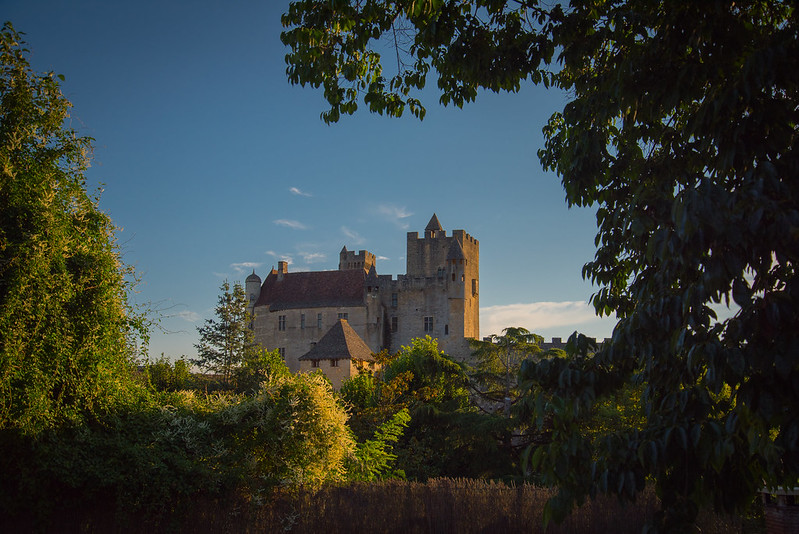 Beynac Fortress in the autumn light ©Dan Courtice/Sarlat Tourisme
Beynac Fortress in the autumn light ©Dan Courtice/Sarlat Tourisme10. Ardèche, if you like it a bit wild
The autumn season is perfect for the Ardèche, that wild area in central France which is so isolated it doesn't even have a train station. But… it’s chestnut time and everything revolves around it. Restaurant menus feature entire meals based on them, desserts proliferate, and everyone heads out to the forest to collect them.
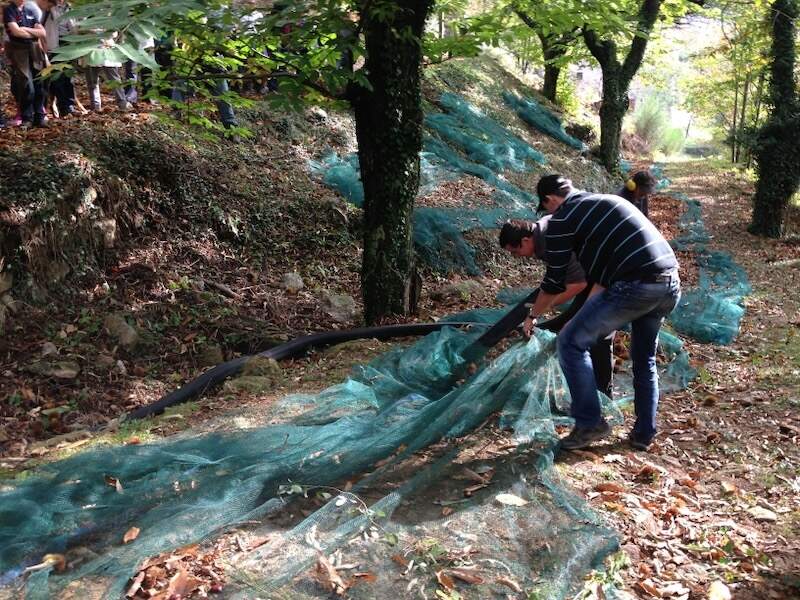
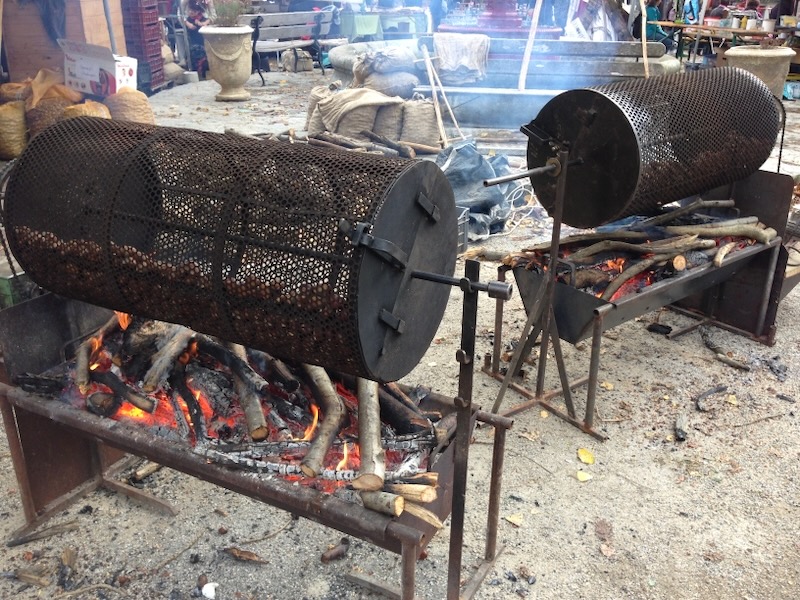 Top: Gathering chestnuts in the fall in Ardèche. Above: Roasting chestnuts in barrels ©OffbeatFrance
Top: Gathering chestnuts in the fall in Ardèche. Above: Roasting chestnuts in barrels ©OffbeatFrance11. The French Alps for mountain lovers
For those who enjoy mountain scenery, the French Alps in the fall are breathtaking, with towns in the foothills, like Annecy, at their best.
Beware of in-between season resorts, however, because many places close in November, after the summer-fall season and before the winter skiers arrive. That said, if you’re looking for pristine lakes and biking trails before the snow sets in, come over and soak in the stunning views you’ll get from the Alps.
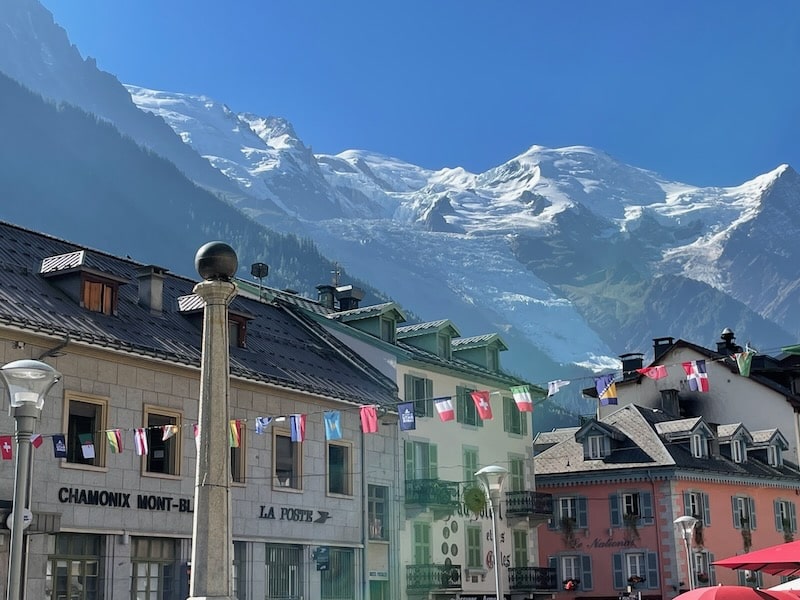 By September, you can expect snow on the Alps ©OffbeatFrance
By September, you can expect snow on the Alps ©OffbeatFrance12. Lyon, city of culture and gastronomy
Last but not least, Lyon is my favorite city, my hangout, it's where I go for the day when I get fed up with the rurality that surrounds me at home. In autumn, you’ll get fabulous culture, beautiful views along its two rivers, and plenty of activity as people return rested from their holidays.
Even in the fog, the city is beautiful...
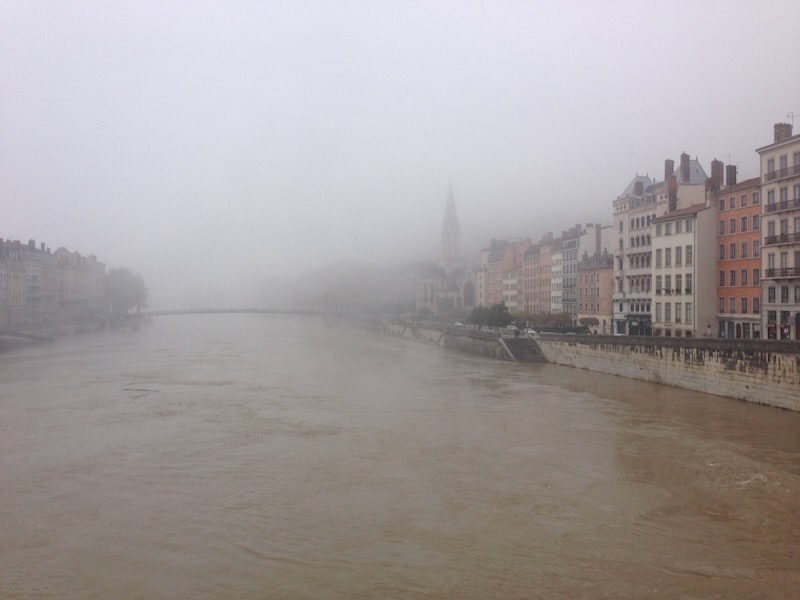 Lyon in the autumn fog ©OffbeatFrance
Lyon in the autumn fog ©OffbeatFranceIf you really want to leave town, any of these short day trips from Lyon will bring you into the very heart of the French countryside.
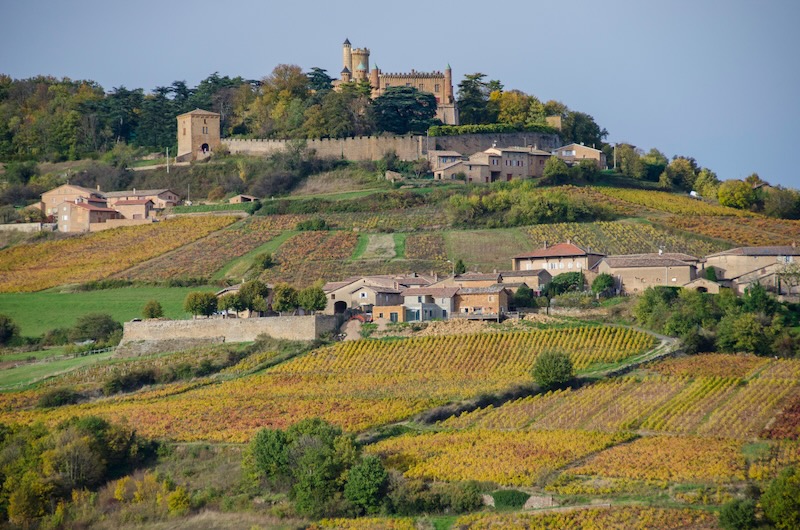 Vineyards of the Beaujolais in the fall
Vineyards of the Beaujolais in the fallBest things you can do in autumn in France
You now have a glimpse of the best places to visit in France in autumn, but you can also look at things another way: by what there is to do seasonally.
Attend festivals and wine festivals
Given the regions I recommended above, this is the obvious one.
This is the time of harvests, of vendanges, which you can witness whether you're in Burgundy, Bordeaux, Alsace, the Loire Valley or beyond.
You can taste the year’s harvest, visit cellars, and take part in atmospheric local celebrations that happen throughout our wine regions, unique to this time of year. Here are some noteworthy ones:
- Montmartre (yes, in Paris!)
- St Emilion, if you’re near Bordeaux
- Alsace – you can be a grape-picker for a day!
- Top 10 celebrations in Burgundy
- Here and there…
If you happen to be near Lyon at Beaujolais Nouveau time, the third Thursday of November, head for the villages around the vineyards known as the Pierres Dorées or for Villefranche-sur-Saône. There’s no one place – as the launch date draws near, you’ll see festivities announced everywhere in the Beaujolais region.
PRO TIP: A great way to visit vineyards in the fall is on a bike, so look for rentals in towns around the major vineyards. The roads aren’t too hilly (and you can rent an electric bike) and our country roads aren’t too crowded.
You’ll find plenty of information at Beaujolais Days, although the English translation doesn’t always work on the website and you may be staring at a page of French. Still, you can use Google Translate and get the gist of what you’re reading…
Head out to view the fall foliage
As is the case in many parts of the world, viewing fall foliage is a major attraction from late September to early November. If you draw a line across the center of France, you’ll find fall foliage pretty much anywhere above that line, from Alsace and Normandy to the Loire Valley to the parks and gardens of Paris.
You’ll also find fall foliage in the south of France, but it may not be as plentiful. Rest assured that as long as there are trees and vines, wherever you go in France in October, you’ll witness the changing of the leaves.
Eat your heart out
Fall is for foodies, no question.
It’s time for those dishes you wouldn’t even consider in summer – like cassoulet and coq au vin and yes, even a few cheese dishes if you wait until it gets colder. And pumpkin au gratin, a local specialty where I live.
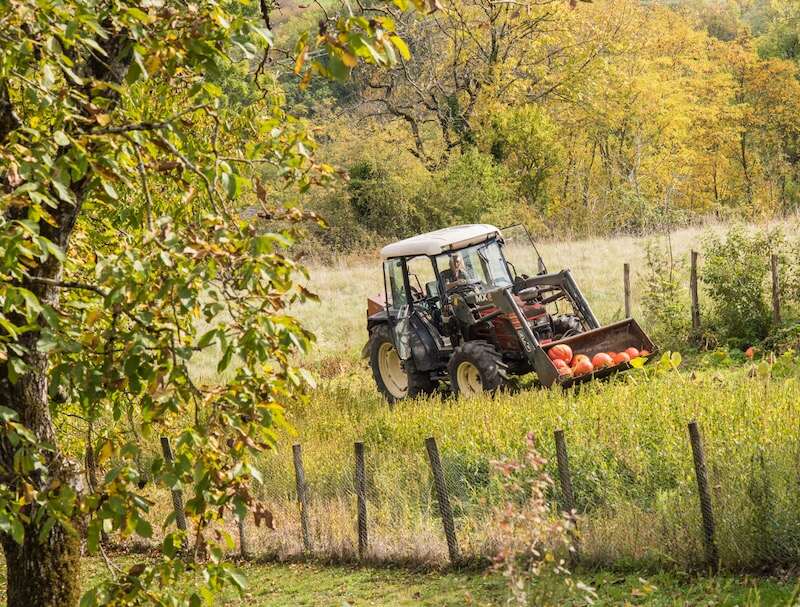 My neighbor Patrick harvesting his pumpkins next door. We get one each year from him ©OffbeatFrance
My neighbor Patrick harvesting his pumpkins next door. We get one each year from him ©OffbeatFranceConsider the seasonality of products: truffle season in the Dordogne and Provence, gourds wherever you find them, stews, anything with potatoes, and cheeses (like something from this Alpine cheese board).
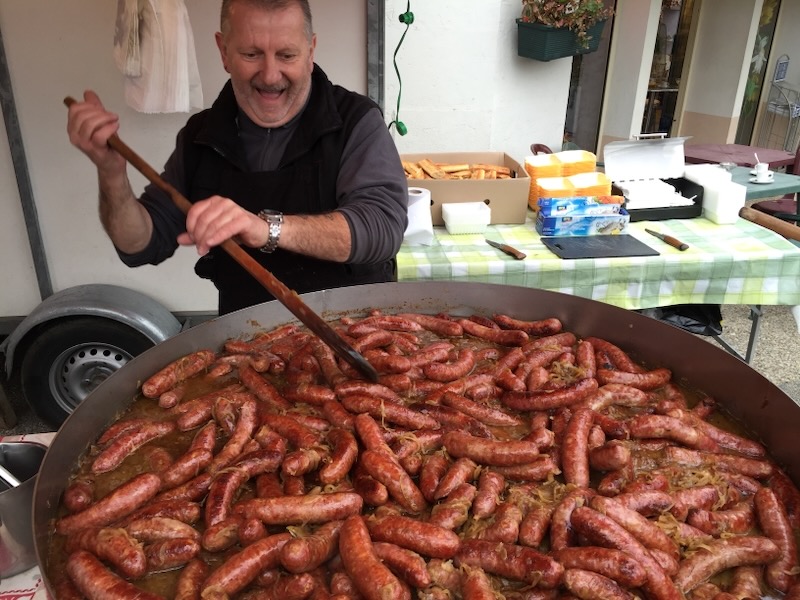 Autumn is when all the food comes out. In my own village of Seyssel, in eastern France, there’s a major festival and flea market each November. Here, the diots (local sausages) are cooking in wine ©OffbeatFrance
Autumn is when all the food comes out. In my own village of Seyssel, in eastern France, there’s a major festival and flea market each November. Here, the diots (local sausages) are cooking in wine ©OffbeatFranceThis is also the start of the hunting season, so game starts appearing on menus. There’s a lot of hunting in France (too much for my taste) and the season tends to begin around the end of September.
And this is the ideal season for seafood, the perfect place for that being anywhere along our coasts. In France our mothers used to say you could eat seafood safely in all months containing the letter “R”: September, October, November and December all belong on this list.
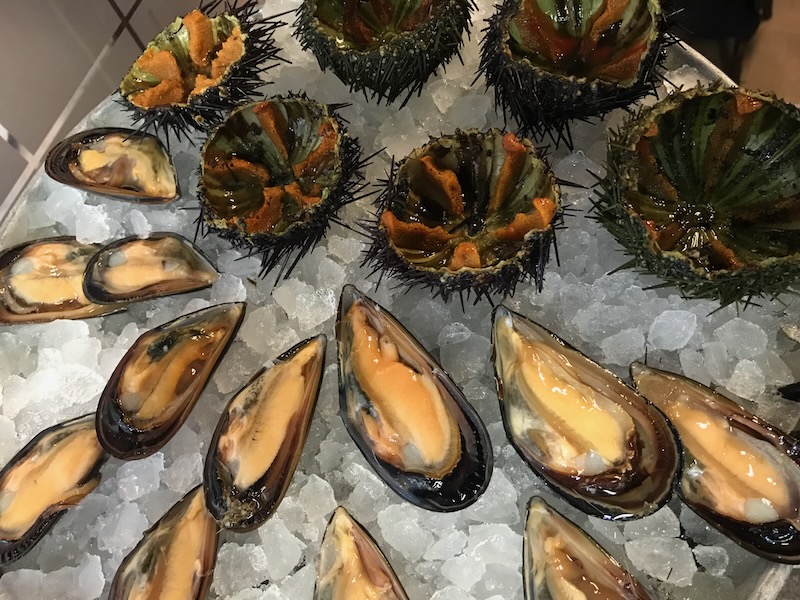
Take a cooking class or taste some wine
This is a wonderful French autumn option – who wants to cook in the summer heat?
If you’re in Paris, you can learn to bake the perfect macaron, or roll beautiful croissants with a French chef. If you’re in Lyon, this is your chance to learn all about our wines.
The local markets are full of seasonal produce with autumn specialties you won’t find the rest of the year.
Enjoy the regal life
This is the perfect season to don your royal robes and head for a castle, in the Loire Valley of course but also anywhere across France.
France has more than 45,000 but bear in mind, many of these are private and cannot be visited.
Here’s a list of the better-known châteaux, many of which you can visit.
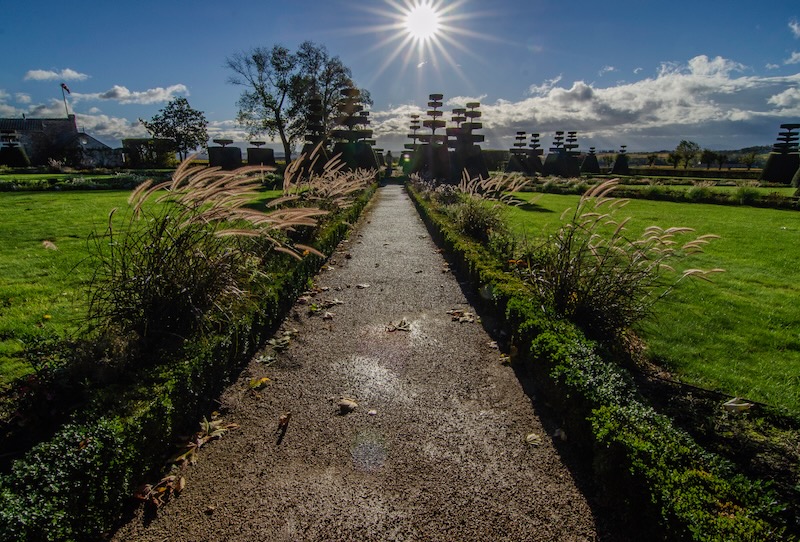 The Domaine de Pizay is wonderful in September, still nearly summer but already the light has changed ©OffbeatFrance/Anne Sterck
The Domaine de Pizay is wonderful in September, still nearly summer but already the light has changed ©OffbeatFrance/Anne SterckFollow a route
France is full of routes that celebrate our regional identities, help preserve our culture, educate us, and allow us to explore the foods and wines of our country.
Autumn is the perfect time to explore many of these, because there are fewer tourists than in summer, and much of France’s produce and specialty products emerge in the fall.
There are routes of every conceivable kind:
- heritage paths (Roman ruins or Romanesque or Renaissance routes)
- religious routes (St James Way)
- wine routes (like the Route du Bugey with local wines near me or the more famous Burgundy route des grands crus or Alsace wine routes)
- château routes (in the Loire Valley but not only)
- food routes (apples in Normandy or cheese in my own region between the Alps and the Jura mountains)
- historical routes (World Wars I and II battles, French Revolution)
- art routes (Impressionism in Rouen, Van Gogh in Provence)...
And that’s just scratching the surface, so if you’ve chosen a region, do a bit of research (or call the tourist office) and find out if there’s a local specialty or route you should be exploring while you’re there.
Take a hike
Literally.
Autumn is a lovely season to hike in France, especially in mountainous or forested regions (although don’t go too high later in the season or you may hit snow).
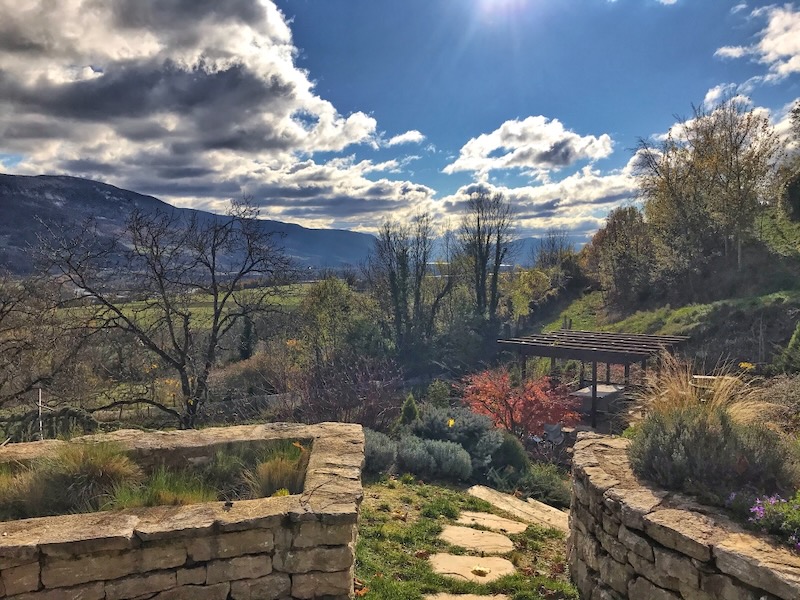
Try the Pyrenees or the area around the Mont Blanc and its various lovely lakes, with foliage that turns auburn at lower altitudes, or any vineyard, whose leaves range from yellow to ochre to deep red in fall. AllTrails provides all sorts of information for hiking in France.
Forests, of course, are perfect for fall – if you’re in Paris and have a car, head for the forest of Fontainebleau, but really, any forest will do. Or the Jardin des Tuileries in town.
If it rains…
That could happen, but it doesn’t have to spoil your sightseeing. France is beautiful on rainy days! Cobblestones glisten, light fog might peek out of a hidden valley, and moutaintops could be wearing their first mantle of snow, so if a really cold spell hasn’t set in, head out and enjoy the freshness.
If the weather has turned cold, granted, there’s little pleasure in freezing while getting wet, and this is the time to imbibe all the culture France has to offer, from museums to wine cellars.
Special fall events in France
It’s worth knowing the important dates in fall, whether you want to avoid them or take part in them.
Fête des Vendanges (Late September to late October)
The Fête des Vendanges celebrates the grape harvest. While the most famous may be the one in Montmartre, with its wine tastings, parades, concerts, and fireworks, you’ll find others throughout France’s wine regions. Check with the local tourist offices for exact locations and dates.
Halloween: 31 October
This has only been a “thing” in the past 20 years or so. I remember my brother organizing a Halloween treasure hunt in our then home village, Yvoire, and it was such a novelty that local TV stations came to shoot the event.
Now, it’s as commercialized as everywhere, with supermarket shelves bulging with plastic witch and skeleton costumes and an emerging trick-or-treat tradition.
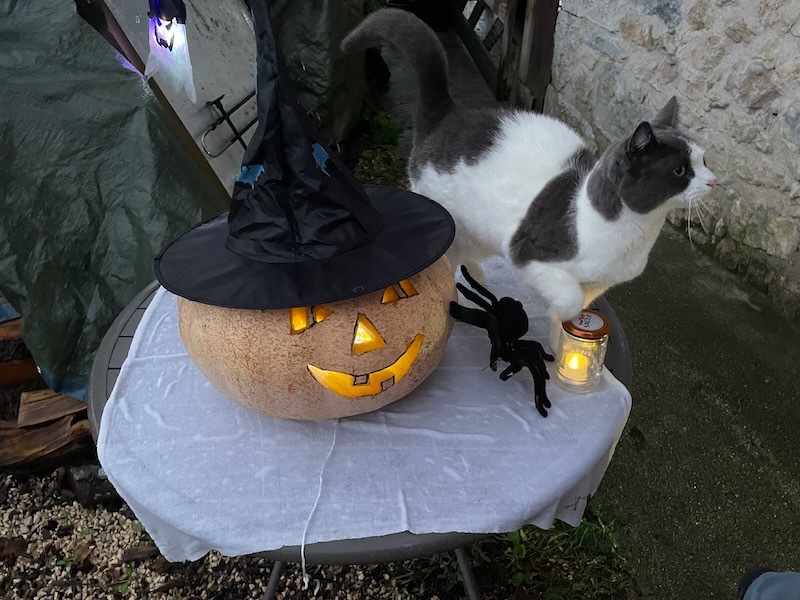 Preparing the decorations for the evening groups of children who’ll be coming by for their candies (with a little help from one of my six felines) ©OffbeatFrance
Preparing the decorations for the evening groups of children who’ll be coming by for their candies (with a little help from one of my six felines) ©OffbeatFranceLa Toussaint (All Saints’ Day): 1 November
Toussaint is a public holiday in France, a day to honor all saints and deceased loved ones and a reflection of France’s strong Catholic heritage. This is when we visit cemeteries and place flowers, especially chrysanthemums, on graves. It's a solemn day, marked by remembrance and reflection.
Armistice Day: 11 November
This public holiday commemorates the end of World War I in 1918. Nationwide ceremonies honor fallen soldiers, with the largest event taking place at the Arc de Triomphe in Paris, where the President of France lays a wreath at the Tomb of the Unknown Soldier.
Beaujolais Nouveau Day (Third Thursday in November)
Wherever you are in the world, you’ve probably heard of it: it celebrates the release of the year's Beaujolais Nouveau wine. Across France, people gather in wine bars and restaurants to taste the new vintage, accompanied by lively parties and special events. You’ll also find these in the Beaujolais region, where there’s a particularly festive atmosphere.
Christmas markets (from end November onwards)
Contrary to popular belief, France’s Christmas markets don’t start around Christmas but way before, often during the last week of November. The Christmas spirit is there, with plenty of decorations, cheer, lights and hot mulled wine to stave of the creeping cold.
Lyon Lights Festival: 8 December
This is edging towards winter but is a fabulous event that takes place annually in the city of Lyon. For four days, the city dances with lights every evening, with dazzling shows against medieval and Renaissance buildings and, yes, massive crowds. But it’s still an event I try not to miss. Here’s what my latest visit was like.
Travel tips for autumn travel in France
Predicting the weather in France was always going to be dicey, but with the climatic mayhem we’ve experienced in recent years, it’s all but impossible. The only near-certainties in fall are rust-colored foliage and rain.
Not very helpful, but I’ve worn T-shirts in February and had to light my fireplace in July.
I warned you it would vary wildly…
Fall weather in France
In Northern France, which includes Paris and Normandy, the start of autumn is mild, on some days a continuation of summer. By October, you’re looking at frequent showers, and as the season advances, it will get colder and rainier.
In Eastern France (my region), the weather is absolutely unpredictable. In theory, the weather cools gently as the weeks go by. We do get our share of fog, especially at night and early morning, and fog is densest in December. We may also get frost and even snow on the ground, depending on our altitude. Mostly, though, we get cool, crisp weather.
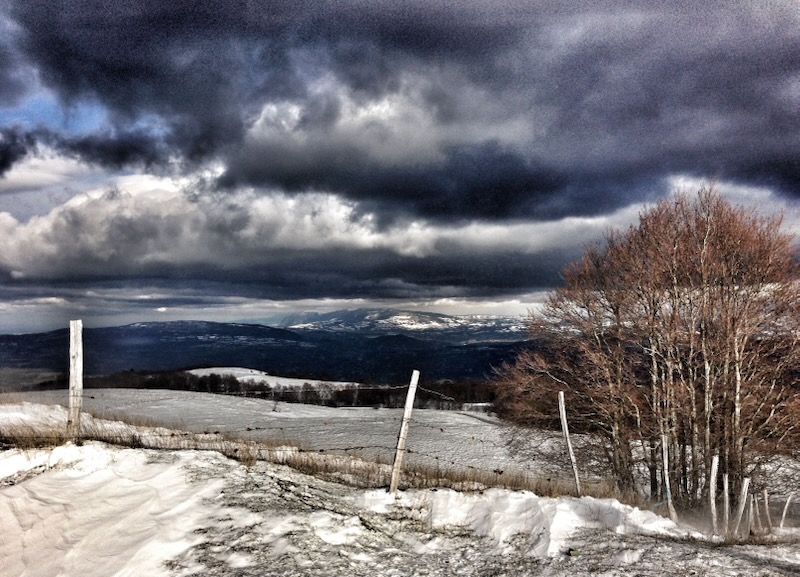 The mountain behind my house in the fall ©OffbeatFrance/Leyla Alyanak
The mountain behind my house in the fall ©OffbeatFrance/Leyla AlyanakIn Western France, the weather tends to be milder than in the east, although you can expect some storms coming in from the Atlantic and cool and wet weather in November.
In Southern France and Provence, September is almost still summer, but without the stifling heat. October is a delight, with more rain in November (but definitely less than in the rest of the country).
And finally, in the mountainous regions – the Massif Central, the Alps and the Pyrenees – temperatures begin to drop quickly in autumn, with snow at altitude, even in early fall. By November, snow is pretty common in the mountains and the resorts get ready for the ski season.
What to pack for France in fall
The same rules apply in all seasons in France: versatility, adaptability, comfort, neutral colors. Some things you’ll need in every season, like a simple travel adapter or a good anti-theft purse.
But for fall in particular, you should make sure you have a few extras: A good scarf or two – mind you, France is the land of scarves so you can easily buy a few here, whether it's warm or decorative or practical like this infinity scarf that also holds your belongings.
- An umbrella, a poncho (if you’re hiking) or waterproof jacket or raincoat
- Various clothing layers, because the weather can range from summer to winter, depending on the day and the region
- Shoes with a good grip if you’re visiting older cities and picturesque villages (cobblestones are very slippery in the rain)
Before you go…
Autumn is definitely a great time to visit France, and for many, it is the best season. But in case you’d like to know, here’s what the rest of the year is like.
And if you’re heading to Paris in the fall, here are some exciting things to do in the French capital while you’re there.
Have a lovely autumn!

